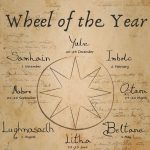What Are Pagan Holidays: Exploring the World of Ancient Traditions

Hey there, folks. Today we’re going to dive into the fascinating world of pagan holidays. What are pagan holidays, you ask? Well, let’s start with the basics. Paganism is a broad term that encompasses various spiritual paths that are connected to nature and the cycles of the seasons. These holidays are an integral part of pagan culture, and they’re still celebrated by many around the world.
A Brief History of Pagan Holidays
The word "pagan" comes from the Latin word "paganus," which means "country dweller" or "rustic." In ancient times, paganism was the default spirituality of the common people, while the elite practiced more formal, organized religions. As Christianity and other monotheistic faiths spread, paganism became associated with idolatry and heresy.
Despite the decline of paganism as a mainstream spirituality, many ancient traditions and customs survived and evolved over time. Today, modern paganism encompasses a wide range of spiritual paths, including Wicca, Druidry, Asatru, and many others.
What Are Pagan Holidays: A Seasonal Perspective
Pagan holidays are often tied to the cycles of nature and the seasons. These holidays are designed to honor the gods, goddesses, and spirits that are associated with each time of year.
The Wheel of the Year
In many pagan traditions, the year is divided into eight Sabbats, or seasonal festivals. These Sabbats are spaced evenly throughout the year and are designed to mark important milestones in the natural world.
- Yule (December 20-23): The winter solstice, which marks the longest night of the year and the beginning of the sun’s journey back towards the equator.
- Imbolc (February 1-2): A festival of light and purification, which marks the midpoint between Yule and the spring equinox.
- Ostara (March 19-22): The spring equinox, which celebrates the return of life and fertility to the world.
- Beltane (April 30-May 1): A festival of fire and fertility, which marks the beginning of summer.
- Litha (June 19-22): The summer solstice, which celebrates the peak of the sun’s power and the longest day of the year.
- Lammas (July 31-August 1): A festival of harvest and gratitude, which marks the beginning of autumn.
- Mabon (September 20-23): The autumnal equinox, which celebrates the second harvest and the balance of light and darkness.
- Samhain (October 31-November 1): A festival of the dead, which marks the end of the harvest season and the beginning of winter.
What Are Pagan Holidays: A Deeper Look
So, what are pagan holidays, exactly? At their core, these holidays are a way of connecting with nature, honoring the gods and goddesses, and celebrating the cycles of life and death.
Each pagan holiday has its own unique traditions and customs, but most involve some combination of the following elements:
- Rituals and ceremonies: These can range from simple meditations and prayers to elaborate festivals and sacrifices.
- Feasting and merriment: Pagan holidays are often celebrated with feasts, music, and dancing.
- Seasonal activities: Many pagans participate in seasonal activities such as gardening, crafts, and outdoor pursuits.
- Honoring the gods: Pagan holidays often involve offerings and devotions to the gods and goddesses associated with each season.
What Are Pagan Holidays: Modern Celebrations
So, what are pagan holidays in the modern world? Today, paganism is a thriving spirituality with a wide range of traditions and practices.
Many modern pagans celebrate the Sabbats with rituals and ceremonies, often in a group or coven setting. Others may prefer to celebrate alone, with personal rituals and devotions.
In addition to the Sabbats, many modern pagans also celebrate other holidays and festivals, such as the full moon and new moon, the equinoxes, and the solstices.
Conclusion: What Are Pagan Holidays
So, what are pagan holidays? They’re a way of connecting with nature, honoring the gods and goddesses, and celebrating the cycles of life and death. Whether you’re a seasoned pagan or just curious about this spirituality, pagan holidays offer a wealth of inspiration and guidance for living a more meaningful, authentic life.
What are pagan holidays, you ask? Now you know.
<